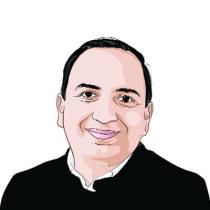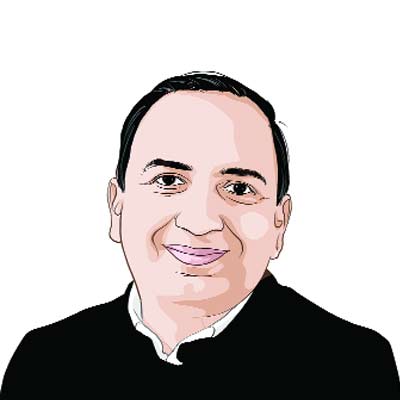Verdict as first word
The Supreme Court judgment does not provide a consistent framework to ascertain future legitimate uses of Aadhaar.

The general presumption seems to be that the use of Aadhaar for commercial exploitation of data is impermissible. But the majority claims that Aadhaar is not a tool for surveillance, without doing much to reassure on that count. (Illustration: C S Sasikumar)
Constitutional judgments, even significant ones, often do not provide closure. Despite the seemingly nuanced settlements provided by the 4-1 majority in the Aadhaar case on a number of issues ranging from the constitutionality of Aadhaar to the reading down of Section 57 of the Aadhaar Act, the underlying debates that precipitated this case will reappear in different forms. There is good reason to think that this judgment may be the first rather than the last word on the matter.
A significant part of the argument in both the majority and dissenting judgment turn on an interpretation of an empirical description of Aadhaar. There are streaks of predetermined empirical judgment in both the majority and the dissenting judgment. The majority has been quite cavalier in its acceptance of the state’s empirical contentions that Aadhaar is safe, cannot be used for surveillance, and does not have error rates that warrant concern. The dissent powerfully shakes our confidence in these assumptions. It has rightfully also asked the question whether there are less intrusive ways of fulfilling the service delivery aims that Aadhaar promises. But it skewed a comparative assessment of the later by minimising or not adequately examining the ways in which pre-Aadhaar forms of identification has their own deep indignities, errors and violations of rights built in. This is what started off the Aadhaar debate in the first place. The judgment does not settle this debate, and it will be re-litigated in the light of new facts.
The majority judgment upheld the validity of Aadhaar but limited its use. But it has not provided a consistent framework by which future legitimate uses can be ascertained. The rationale for linking some rights and services provided by the state, and not others is not entirely clear. The general presumption seems to be that the use of Aadhaar for commercial exploitation of data is impermissible. But the majority claims that Aadhaar is not a tool for surveillance, without doing much to reassure on that count. The dissent is right in suggesting that despite the current roll back, mission creep is built into the logic of Aadhaar. While the majority provided data protection in many forms, especially by preventing private sector use, the basic question of who can use the data which is linked to Aadhaar and for what purposes is not entirely clear. The court has allowed linking PAN cards to Aadhaar, thereby indirectly linking bank accounts to Aadhaar, even though formally Aadhaar is not required for bank accounts. We still do not have a clear account of who can use this kind of linking and for what purposes?
Justice D Y Chandrachud’s brilliant dissent displays an impressive grasp of the constitutional, empirical and moral issues. It is spot on in its analysis that the Aadhaar Bill was a fraud on the Constitution. The UPA was cavalier in doing something like Aadhaar without a covering legislation for years; the NDA brought in legislation through patently unconstitutional means. It is a pity that brazenly changing the facts on the ground almost always triumphs over constitutional morality in India.
Chandrachud’s dissent also rests on two eloquent philosophical principles: The importance of choice and the value of plurality. In particular, the idea that it is up to the citizens to choose the forms in which they accept to be identified by the state is wonderfully enchanting. In fact, the entire Aadhaar judgment would have be very straightforward if the Court had taken this line of thought and made it voluntary. But the choice argument and the multiplicity of identification arguments may prove too much. They may allow Aadhaar greater back door entry.
The thought is this. Let us say we value choice. Do we value it to the point where we say that it is up to citizens to decide what trade-offs they want to make and what risks they are willing to incur? The Court’s job is to protect us from arbitrary use of state power. But on the choice and plurality of identification arguments, it is not entirely clear what would be wrong if a telecom company said, “you can have a phone one of two ways: By eKYC using Aadhar, or by producing six other documents. The choice on all the attendant risks and efficiencies is yours”.
There may be a separate concern about how data might be used and its commercial exploitation. But the claim that identity should not be reduced to identification by Aadhaar does not establish that Aadhaar should not be an option. The irony is that the choice and multiplicity of identification arguments can be used as a normative basis for legislation enabling the use of Aadhaar by private companies under certain conditions.
ALSO READ | Aadhaar Act as Money Bill: Fraud on Constitution…violates rights, says Justice Chandrachud
This points to a troubling issue. Critics of Aadhaar were right that its compulsory character, often enforced de facto if not de jure, violated rights and dignity. But if its compulsory character is taken away do we know what a vast majority of people would choose, exercising their individual choice qua individuals? Certainly, the voluntary surrender of privacy, and the quest for security in our culture is very strong. The genius of the new technologies has been precisely to use choice and multiplicity to create a regime of legibility and surveillance. From the point of view of democratic theory, the suspicion will linger whether the choice argument is really about giving people the choice, or has it simply been weaponised for reaching conclusions one wants? I suspect, the state will now try and achieve by choice what it could not achieve through coercion.
The judgment points to the runaway hubris that had taken over government and the private sector. The mindless application of Aadhaar needed to be checked. This judgment does that. This is important in a context where the state is shifting the presumption of innocence. With the clamour for extending the NRC increasing, you will have to prove that you are a citizen rather than the state having to disprove that you are not. It is also being presumed that the state has the right to seek more and more information on the presumption that you might be guilty of anything from money laundering to terrorism. So the scepticism of Aadhaar on these grounds was well founded. But on the question of the poor, in the name of whose empowerment both sides of the debate speak, shall probably remain an open one. It still looks like both sides have presumed to speak on what will enable the empowerment of the poor, without really knowing what actually will.
The writer is vice-chancellor, Ashoka University. Views are personal
For all the latest Opinion News, download Indian Express App
More From Pratap Bhanu Mehta
- The second comingGlobal cooperation is a vital element in managing global economic interdependence. But global cooperation is exactly what has been domestically de-legitimised in almost all democracies.…
- On libertyTomorrow’s India needs a new Charter of Freedom. Does Congress have the courage to sign on to it?..
- Where’s the Remote?Democracy was supposed to give power to the people. Instead, it has conferred sweeping powers on the executive ..








































No hay comentarios:
Publicar un comentario